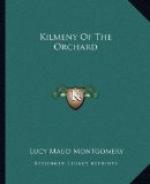CHAPTER VII. A ROSE OF WOMANHOOD
When he emerged from the spruce wood and entered the orchard his heart gave a sudden leap, and he felt that the blood rushed madly to his face. She was there, bending over the bed of June lilies in the centre of the garden plot. He could only see her profile, virginal and white.
He stopped, not wishing to startle her again. When she lifted her head he expected to see her shrink and flee, but she did not do so; she only grew a little paler and stood motionless, watching him intently.
Seeing this, he walked slowly towards her, and when he was so close to her that he could hear the nervous flutter of her breath over her parted, trembling lips, he said very gently,
“Do not be afraid of me. I am a friend, and I do not wish to disturb or annoy you in any way.”
She seemed to hesitate a moment. Then she lifted a little slate that hung at her belt, wrote something on it rapidly, and held it out to him. He read, in a small distinctive handwriting,
“I am not afraid of you now. Mother told me that all strange men were very wicked and dangerous, but I do not think you can be. I have thought a great deal about you, and I am sorry I ran away the other night.”
He realized her entire innocence and simplicity. Looking earnestly into her still troubled eyes he said,
“I would not do you any harm for the world. All men are not wicked, although it is too true that some are so. My name is Eric Marshall and I am teaching in the Lindsay school. You, I think, are Kilmeny Gordon. I thought your music so very lovely the other evening that I have been wishing ever since that I might hear it again. Won’t you play for me?”
The vague fear had all gone from her eyes by this time, and suddenly she smiled—a merry, girlish, wholly irresistible smile, which broke through the calm of her face like a gleam of sunlight rippling over a placid sea. Then she wrote, “I am very sorry that I cannot play this evening. I did not bring my violin with me. But I will bring it to-morrow evening and play for you if you would like to hear me. I should like to please you.”
Again that note of innocent frankness! What a child she was—what a beautiful, ignorant child, utterly unskilled in the art of hiding her feelings! But why should she hide them? They were as pure and beautiful as herself. Eric smiled back at her with equal frankness.
“I should like it more than I can say, and I shall be sure to come to-morrow evening if it is fine. But if it is at all damp or unpleasant you must not come. In that case another evening will do. And now won’t you give me some flowers?”
She nodded, with another little smile, and began to pick some of the June lilies, carefully selecting the most perfect among them. He watched her lithe, graceful motions with delight; every movement seemed poetry itself. She looked like a very incarnation of Spring—as if all the shimmer of young leaves and glow of young mornings and evanescent sweetness of young blossoms in a thousand springs had been embodied in her.




